Related Research Articles
Articles related to the Azerbaijan Republic include:
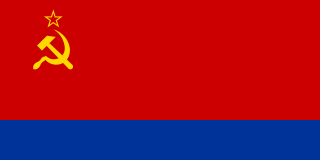
The Azerbaijan Soviet Socialist Republic, also referred to as the Azerbaijani Soviet Socialist Republic, Azerbaijan SSR, Azerbaijani SSR, AzSSR, Soviet Azerbaijan or simply Azerbaijan, was one of the constituent republics of the Soviet Union between 1922 and 1991. Created on 28 April 1920 when the Russian Soviet Federative Socialist Republic brought pro-Soviet figures to power in the region, the first two years of the Azerbaijani SSR were as an independent country until incorporation into the Transcaucasian SFSR, along with the Armenian SSR and the Georgian SSR.
The Petroleum Production Company Nobel Brothers, Limited, or Branobel, was an oil company set up by Ludvig Nobel and Baron Peter von Bilderling. It operated mainly in Baku, Azerbaijan, but also in Cheleken, Turkmenistan. Originally established by Robert Nobel and the investments of barons Peter von Bilderling and Standertskjöld as a distillery in 1876, it became, during the late-19th century, one of the largest oil-companies in the world.

The Azerbaijan Democratic Republic, also known as the Azerbaijan People's Republic, was the first secular democratic republic in the Turkic and Muslim worlds. The ADR was founded by the Azerbaijani National Council in Tiflis on 28 May 1918 after the collapse of the Transcaucasian Democratic Federative Republic, and ceased to exist on April 28, 1920. Its established borders were with Russia to the north, the Democratic Republic of Georgia to the north-west, the Republic of Armenia to the west, and Iran to the south. It had a population of around 3 million. Ganja was the temporary capital of the Republic as Baku was under Bolshevik control. The name of "Azerbaijan" which the leading Musavat party adopted, for political reasons, was, prior to the establishment of the Azerbaijan Democratic Republic in 1918, exclusively used to identify the adjacent region of contemporary northwestern Iran.

Alimardan bey Alakbar bey oghlu Topchubashov was a prominent Azerbaijani politician, foreign minister and speaker of the Parliament of Azerbaijan Democratic Republic.

Hajji Mirza Zeynalabdin Taghi oghlu Taghiyev was an Azerbaijani national industrial magnate and philanthropist.
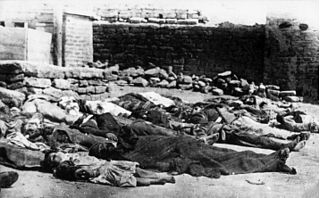
The March Days or March Events was a period of inter-ethnic strife and clashes which took place between 30 March – 2 April 1918 in the city of Baku and adjacent areas of the Baku Governorate of the Transcaucasian Commissariat.

Jeyhun bey Abdulhuseyn bey oghlu Hajibeyli (1891–1962) was an Azerbaijani publicist, journalist and ethnographer.
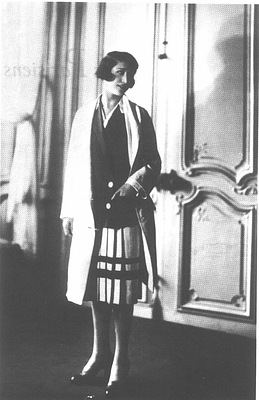
Umm-El-Banine Assadoulaeff was a French writer of Azerbaijani descent who wrote under the penname of Banine.
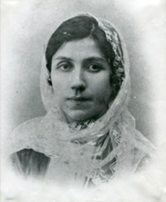
Sakina Mirza Heybat qizi Akhundzadeh was an Azerbaijani playwright. She was the first known female playwright and dramatist in Azerbaijani literature.
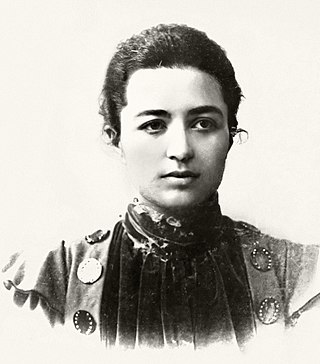
Hamida Ahmad bey qizi Javanshir was an Azerbaijani activist and one of the first enlightened women of Azerbaijan, wife of Jalil Mammadguluzadeh, daughter of historian Ahmad Bey Javanshir, philanthropist, translator, member of Azerbaijan Writers' Union.
Currently, there are more than 200,000 Azerbaijanis in Germany. About 17,000 of them live in the capital city of Berlin. The majority of Azerbaijanis work in the field of service and construction. The minority of Azerbaijanis are involved in state structures, universities and hospitals. There are no compact settlements of Azerbaijanis in Germany.

The Red Army invasion of Azerbaijan, also known as the Sovietization or Soviet invasion of Azerbaijan, took place in April 1920. It was a military campaign conducted by the 11th Army of Soviet Russia with the aim of installing a new Soviet government in the Azerbaijan Democratic Republic. This invasion occurred simultaneously with an anti-government insurrection organized by local Azerbaijani Bolsheviks in the capital city of Baku. As a result of the invasion, the Azerbaijan Democratic Republic was dissolved, and the Azerbaijan Soviet Socialist Republic was established.

Jamil Poladkhan oghlu Hasanli is an Azerbaijani historian, author and politician. He served as a professor at Baku State University in 1993–2011 and as a professor at Khazar University in 2011–2013. He was an advisor to the President of Azerbaijan in 1993 and served two terms in the Parliament of Azerbaijan between 2000 and 2010. He was the main opposition candidate in the 2013 Azerbaijani presidential election where he came in second with 5.53% of votes. He has been the leader of National Council of Democratic Forces of Azerbaijan since 2013.

The Ashurbeyovs or Ashurbeylis are an Azerbaijani noble family, with an extensive history and bloodline.

Mirza Asadullayev Shamsi oghlu was an Azerbaijani industrial magnate, philanthropist and statesman who served as Minister of Industry and Trade in the third cabinet of Azerbaijan Democratic Republic, and was member of Parliament of Azerbaijan.
Fatali Khan or Fath Ali Khan of Quba was a khan of the Quba Khanate (1758–1789) who also managed to dominate the Derbent, Baku, Talysh and Shirvan Khanates, as well as the Salyan Sultanate during much of his reign.
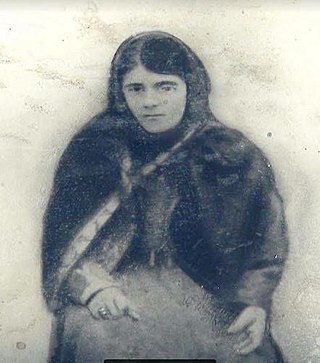
Peri-Khan Sofieva was the first Muslim woman elected to office.

Teymur bey Novruzov was a decorated Imperial Russian and Azerbaijani military commander, having the rank of major-general.
Sona Mehmandarova was an Azerbaijani woman who won a world-renowned beauty contest in 1912. She was also a laureate of beauty competitions organized in the Russian Empire.
References
- ↑ "The Child Of Emigration". Azerbaijan Gender Information Center.
- ↑ "Банин (Асадуллаева Умм-Эль-Бану Мирза кызы) - писатель". Наш Баку.
- ↑ "Рамиз Абуталыбов: "Банин всегда и везде гордо заявляла, что она азербайджанка"". Day.Az.
- ↑ "Days in the Caucasus: Banine review - revolutions, pogroms and love". theartsdesk.com. 21 April 2019. Retrieved 2019-04-24.
- ↑ Steavenson, Wendell (5 April 2019). "Days in the Caucasus by Banine — tales of old Baku". Financial Times. Retrieved 2019-04-24.
- ↑ "Days in the Caucasus by Banine - review". Evening Standard. 2019-04-11. Retrieved 2019-04-24.
- ↑ "Days in the Caucasus by Banine | Pushkin Press".
- ↑ "Азербайджанцы во Франции | Ежедневный информационный ресурс - "Azeri.ru - Азербайджанцы в России"". 2011-08-17. Archived from the original on 2011-08-17. Retrieved 2019-04-24.
- ↑ "Кавказские дни | Иные берега". www.inieberega.ru. Retrieved 2019-04-24.